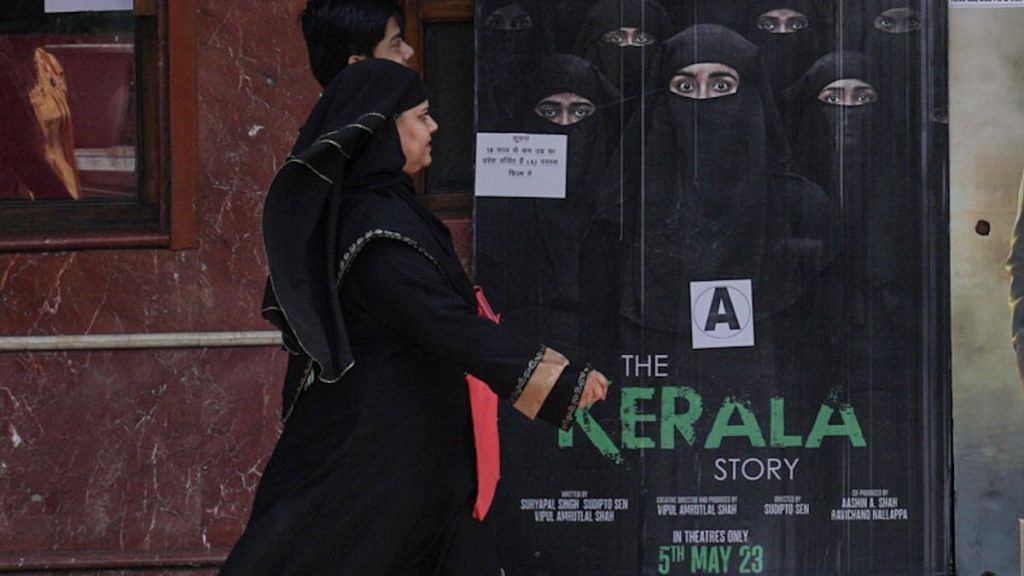Hyderabad: After four days of protests by the Bharatiya Janata Party (BJP) and Right-wing groups, Bhainsa town in Telangana’s Nirmal district Tuesday began screening the controversial film The Kerala Story at its lone cinema hall, the Kamala Theatre.
However, it is screening only two shows per day — a traditional single-screen theatre usually has four shows daily — amid police deployment at the premises.
The BJP and protesting groups are encouraging young Hindu women to watch the movie.
Speaking to ThePrint, BJP district president for Nirmal, P. Rama Devi, said: “The cops, citing law and order issues, had objected to the screening of the movie. It was supposed to be shown Friday onwards, but that did not happen. The theatre management was told not to screen the film.”
“The police had even removed the posters, but we and the Hindu Yuva Vahini (a Right-wing group) put them up again. After I met the police Monday, they agreed to give permission for the movie screening,” she said, adding that the cops, however, agreed to only two shows a day since police deployment is difficult for night shows.
“I want every Hindu girl in Bhainsa to watch the film. We do have a few ‘love jihad’ cases here in the town and even in the district. I personally stopped two Hindu women from marrying Muslim men and converting (to Islam), and even filed complaints against those men,” said Devi. “I am planning to book the entire theatre for a show one day and take as many young women as possible to watch the film.”
According to the theatre’s management, they, too, had visited the office of the assistant superintendent of police (ASP) to ask for permission to screen the film.
“The cops had objected earlier, so the management met the ASP and requested him to allow us to show the movie. The cops had pulled up our staff, asking if we were aware how the film could cause tension in the town, given Bhainsa’s communal nature,” said theatre in-charge Madhav Rao.
While sources in the Bhainsa police department told ThePrint that the show was objected to earlier, ASP Kantilal Patil denied it.
Patil said that while police have indeed been deployed at Kamala Theatre now, they had never objected to the screening and that it was the theatre management that wanted to screen other movies.
“Even now, it is their choice to screen only two shows of the movie. For the other shows, they want to screen other films,” Patil said, adding that cops will always keep an eye out for law and order in Bhainsa.
Also read: ‘First Kashmir Files, now The Kerala Story’: Films being used to fuel hate, writes Urdu press
In the past…
Bordering the former Naxal hotbed of Adilabad district, Bhainsa, known for its beedi industry, has a population of 49,764 people (2011 census). Of this, 49 per cent are Hindus and 47 per cent Muslims, and the BJP and the All India Majlis-e-Ittehadul Muslimeen (AIMIM) both have a presence here.
Out of the 26 municipal wards in Bhainsa, Asaduddin Owaisi’s AIMIM controls 15, leaving the rest to other parties, including the BJP, which holds nine wards and is an aggressive protector of Hindus in town.
In March 2021, Bhainsa had seen communal clashes which had resulted in 12 people, including three policemen, getting injured. During the violence, 13 shops, four houses, six four-wheelers, four auto rickshaws, and five two-wheelers were also torched. Over 40 arrests were made at the time.
Since January 2020, the town has reported three communal clashes and experienced 10-day Internet shut downs at least twice, including in March 2021. The town is also used to seeing heavy police deployment.
“We will fight to see that all four shows (of the film) are allowed. We want all women and their parents to watch the film,” said Rama Devi.
(Edited by Zinnia Ray Chaudhuri)
Also read: The Kerala Story—It’s time Muslims give up their medieval ideal of conquest, conversion
